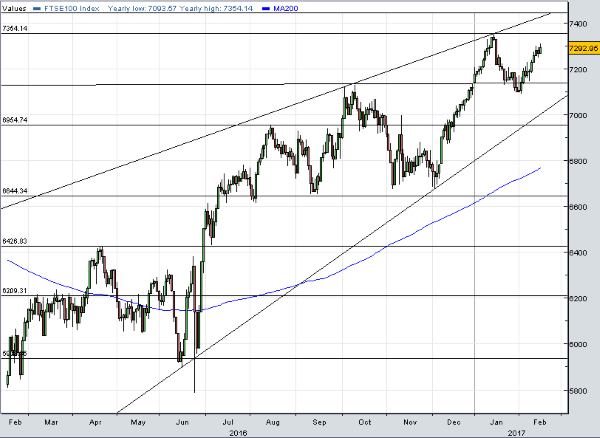Predicting the stockmarket crash
15th February 2017 12:04
That the three main US indices all hit a record high last night is hardly news. After a fourth best in as many days we've become desensitised to the thrill, and, like an overdue pregnancy, that much-predicted correction refuses to deliver.
Fed chair Janet Yellen's testimony to Congress last night did nothing to quicken the birth. A rate hike in March is possible, but unlikely given the problem of underemployment and slow wage growth offsetting an uptick in inflation toward 2%.
But US rates will rise, more probably in June, and Yellen's optimistic view of the American economy has kept the equities party going.
"Waiting too long to remove accommodation would be unwise, potentially requiring the FOMC to eventually raise rates rapidly, which could risk disrupting financial markets and pushing the economy into recession," she warned.
"At our upcoming meetings, the Committee will evaluate whether employment and inflation are continuing to evolve in line with…expectations, in which case a further adjustment of the federal funds rate would likely be appropriate."
Banks buoyed
This stirred further interest in banks stateside. now trades at a record high. smashed its previous best months ago, and just keeps going. There's a knock-on effect over here, too, as higher growth typically means higher interest rates, which are great for a lender's margins.
Check out the biggest movers in London Wednesday – , , and make up two-thirds of the top six risers.

Reflecting American optimism, US-focused equipment rental giant and Interactive Investor Winter Portfolio constituent, , is up over 3% to a fresh high. The shares have doubled in the past 12 months, excited by Trump's promise of a massive infrastructure spending spree.
Evidence that Trump and his team might be learning the art of diplomacy far quicker than feared – a more conciliatory stance on China and decision to ditch wayward advisors - is a relief. It lessens the threat of a policy mistake which could derail the Trump Trade.
His political acumen will receive its sternest test in his inaugural State of the Union address to Congress on 28 February.
We'll get a much better idea of the president's plans for taxation and infrastructure, but there is a risk that he reins in proposals for a $1 trillion (£805 billion) splurge to guarantee safe passage through Congress. Ashtead will be keeping everything crossed.
All good things...
But all this excess has to end at some point right?
Yes, of course, and it's easy to make a case for lower share prices. But guessing when markets might finally run out of puff is a fool's game. The S&P 500 currently trades on a Schiller price/earnings (PE) ratio near 29 times. On Black Tuesday in 1929 it was 30.
Numbers like that sharpen the mind, certainly, and they are a red flag, but they don't necessarily mean a crash is imminent. At times like this it's worth reminding ourselves of the popular John Maynard Keynes quote: "The market can stay irrational longer than you can stay solvent." That's true of movements both higher and lower.
Investors are caught in two minds currently. Try and second-guess the tipping point and take money off the table, or stay invested for fear of missing out on further upside. I know people who've done the former, and they're out of the money.
Despite Brexit and the threat of further political upheaval in Europe, confidence is high that Theresa May will get a "good deal" for Britain.
Yes, the weak pound has flattered FTSE 100 performance, but the UK-focused FTSE 250 index - a reliable barometer of the domestic market - is making record highs for fun. And Lloyds Bank's UK investor sentiment index has just hit a 10-month high.
More UK companies have been beating forecasts than missing them this earnings season, too, and analysts at Barclays expect UK profit growth of 11% in 2017. Further possible improvement in margins could even trigger upward revisions to estimates, unwinding stretched valuations.
Fundamentals appear sound, then; a shock political event still the most likely trigger for any major downward move. Those looking for a steer on future market behaviour might check out successful technical analyst Alistair Strang's latest charts here.
This article is for information and discussion purposes only and does not form a recommendation to invest or otherwise. The value of an investment may fall. The investments referred to in this article may not be suitable for all investors, and if in doubt, an investor should seek advice from a qualified investment adviser.
Editor's Picks